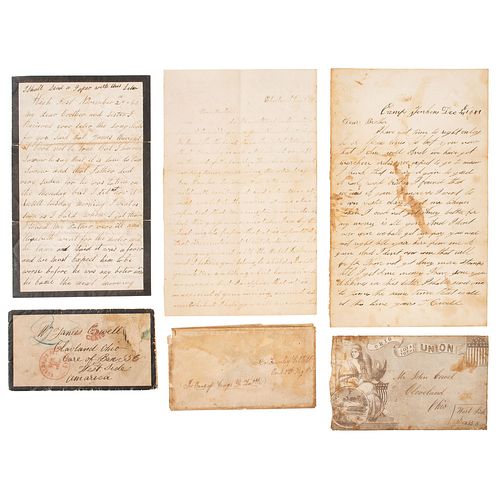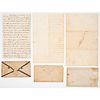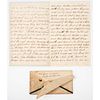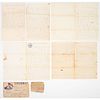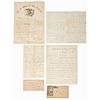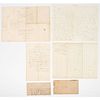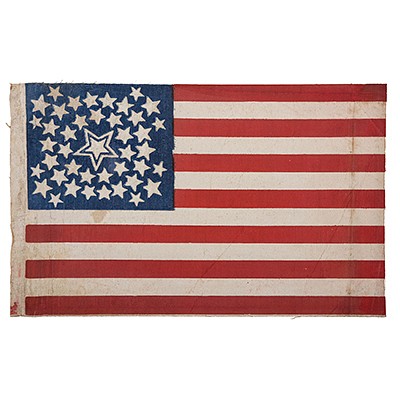Civil War Archive of Private Townley Gillett, Ohio 7th Volunteer Infantry
About Seller
6270 Este Ave.
Cincinnati , OH 45232
United States
With offices in Cincinnati, Cleveland and Denver, Cowan’s holds over 40 auctions each year, with annual sales exceeding $16M. We reach buyers around the globe, and take pride in our reputation for integrity, customer service and great results. A full-service house, Cowan’s Auctions specializes in Am...Read more
Two ways to bid:
- Leave a max absentee bid and the platform will bid on your behalf up to your maximum bid during the live auction.
- Bid live during the auction and your bids will be submitted real-time to the auctioneer.
Bid Increments
| Price | Bid Increment |
|---|---|
| $0 | $25 |
| $500 | $50 |
| $1,000 | $100 |
| $2,000 | $250 |
| $5,000 | $500 |
| $10,000 | $1,000 |
| $20,000 | $2,500 |
| $50,000 | $5,000 |
| $100,000 | $10,000 |
About Auction
Nov 19, 2020
Cowan’s Auctions, a Hindman Company, is pleased to present the November 19 Fall Auction, featuring over 400 lots of historically significant photography, manuscript material, artwork, and other ephemera dating from the 18th through the early 20th century, including the Civil War. Cowan's Auctions dawnie@cowans.com
- Lot Description
Archive of letters and documents related to Townley Gillett (1834-1862) of the 7th Ohio Infantry. Includes 13 letters from Gillett, most to his cousin Susan Bayner; Gillett's promotion to corporal certificate; a debt receipt signed by Gillett; a letter written to him from his sister Sarah; an unsigned letter to someone named Billings; 4 additional letters, most regarding the handling of Gillett's estate; 2 documents including an appraisal for Gillett's estate; and a discharge document from the 150th Ohio National Guard for John Cowell, the administrator of Gillett's estate. Townley Gillett enlisted on April 22, 1861 and was mustered into Co. A of the 7th Ohio Infantry as a private. Promoted to corporal Nov. 20, 1861 (promotion papers included here) but killed in action on June 9, 1862 during the Battle Port Republic in Virginia.His first letter is not long after his enlistment and he is still located at Camp Dennison near Cincinnati. He writes to Susan on June 14, [1861], concerned for his son: "I felt bad when I left my little boy thinking wither I should ever see him again." Records indicate that his wife Hattie Gricenbrier (b. 1837) and his young daughter Ada (b.1860) both died in 1861 and context suggests that his son Franky (1857-1908) was living with his mother in law. In a letter on July 6th, Gillett reports about their trip south from Camp Dennison, opening: "We are in the enemy's country now" and after recounting the long journey, he writes, "just before we got into Weston there was a spy, he fired his gun and we fired three shots at him but he was to far off to hit him...we went into the town double quick and surrounded it in a very short time and we took from forty to fifty secessionists. The Union folks was glad to have us come as soon as we got things straight. The Union folks give us a good breakfast it was just we we wanted after...the Union folks have raised two American flags. We raised one last Monday and on the fourth of July."The Ohio 7th would see extensive action in Western Virginia in the early years of the war, and in a letter written on September 7, 1861, Gillett recounts fighting, likely the Battle of Kessler's Cross Lane, to Susan: "I suppose you have heard we had a fight with the secessionists. We had about eight hundred, the secessionists had three thousand infantry, four hundred cavalry, and six pieces of artillery. We had neither cavalry nor artillery. It was early in the morning they had surrounded us before we knew it. We was just getting breakfast when the pickets was fired and we tried to form a line but the balls came so thick we had to retreat...uphill. Company A, K, and C was in the thickest of the fight. We had, I believe, fifty balls fired for every man of us as soon as we got to the top of the hill there was three rebels companies retreating down to the road."By October, they were stationed in Charleston, of which Gillett writes: "Charleston is the largest place we have been in since we cross the Ohio River here is a great many slaves here. It is very dirty place, There was a flood here about three weeks ago it was so high that it floated the houses from one end of the lots to the other." Shortly thereafter, Gillett was promoted to Corporal, and his promotion document, signed by E.B. Taylor and recommended by Captain Orrin J. Crane is dated Nov. 20, 1861 at Camp Warren, VA. From the beginning of January 1862, the 7th Ohio would be engaged in the Blue's Gap Affair, on March 23 they were at Kernstown , the opening battle of Confederate General Stonewall Jackson's Shenandoah Valley Campaign - a Union victory which proved to be Jackson's only defeat during the war. Gillett wrote Susan to let her know of his safety in a brief letter dated March 26, [1862] from Strasburgh. In his last letter, written from "Camp near Woodstock, Virginia" on April 11, 1862 on Union letterhead, he writes: "The rebels fly for it when we get at them like we did at Winchester. The battlefield the next morning, it looked awful. It is of no use for me to write about the fight for you have seen it in the papers but I have not seen a correct account of the 7th Regt...The seventh was the Regt took the lead we lost more men than any other two Regt on the field killed and wounded." Tragically, Gillett would perish in the Battle of Port Republic on June 9, 1862. The final battle in Jackson's campaign through the Shenandoah Valley was a fierce contest and a decisive victory for Jackson's Valley Campaign, forcing the Union armies to retreat. Frederick Hoffman of Co. A of the 7th Ohio writes to Gillett's family in regards to his fate: "I have tried to find out all I should about Townley Gillett and such things that belonged to him, but there is nothing to be found. The knapsack was burnt when they retreated from the fields at Port Republic. There was nothing taken out of it. They left in such a hurry there was no chance to take it...A soldier a few days ago, he told me that he saw Townley just before he died but was not able to speak. In a short time after this he was dead."There are several letters and documents related to Gillett's estate also included in the archive including letters to his administrator John Cowell and an appraisal of the estate.Letters have been lightly edited for spelling and punctuation for legibility. Various - a few letters have splits on creases, some soiling.
Condition
- Shipping Info
-
Buyers are required to pay for all packing, shipping and insurance charges. Overseas duty charges are the responsibility of the successful Bidder. Be aware that for larger and/or valuable items, shipping charges can be substantial. - If there is no shipping amount on listed your invoice, you will need to make arrangements to pick up or ship your purchase through an alternative shipping company. Our shipping department can be contacted at 513.871.1670 (ext. 219) or email shipping@cowans.com. - Shipping charges include insurance for your order while in transit. If you have private insurance we will adjust your charge to include only packing and shipping. - Please allow 14 – 21 days after payment to package and ship your purchase as carefully as possible.
-
- Buyer's Premium



 EUR
EUR CAD
CAD AUD
AUD GBP
GBP MXN
MXN HKD
HKD CNY
CNY MYR
MYR SEK
SEK SGD
SGD CHF
CHF THB
THB